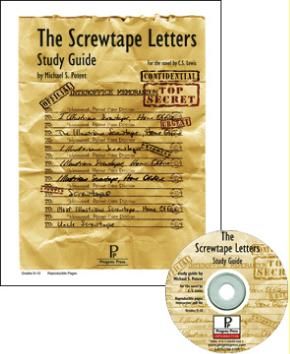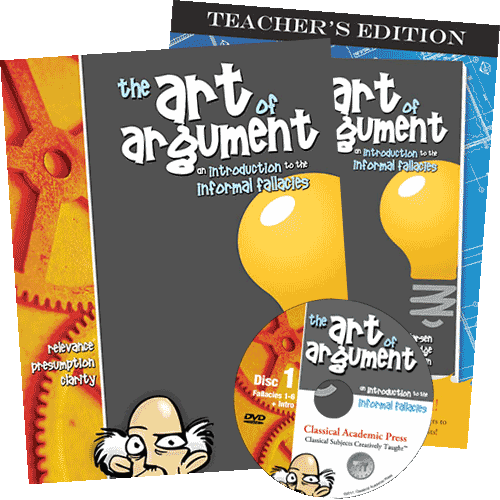My Dear Wormwood,
How do you think you will ever learn anything about British Literature if you don't read any? And if you are going to read some, how about my letters, appropriately entitled The Screwtape Letters? And if you are going to bother to read them, why not study them, analyze them for their literary qualities (I assure you there are many), and make sure that you digest every word I have sent you? You can do all that more easily if you use the Literature Guide provided by Progeny Press! Now get to work, you scruffy little demon!
Your mildly affectionate uncle,
Screwtape
Okay, so I made that letter up. But, Screwtape has a great idea there. If you'd like help in your homeschool with analyzing literature, Progeny Press study guides are an awesome resource! I was privileged to receive the guide for The Screwtape Letters by C.S. Lewis, but there are many other options available, including American, British, Historical, World, and Christian Literature. A few of the titles covered are:
The Adventures of Huckleberry Finn
The Call of the Wild
The Scarlet Letter
The Lord of the Rings
A Tale of Two Cities
Hamlet
Romeo & Juliet
The Hiding Place
Number the Stars
The Lion, the Witch and the Wardrobe
The Bronze Bow
and many, many more in their catalog
The study guides are offered in booklet ($21.99), CD ($18.99), or e-mail .pdf formats ($18.99). They also sell the novels; this one would have cost $13.99. I received the .pdf version which included a 75 page Student Guide, plus a 10 page Answer Key for the teacher/parent. This version is interactive on Windows or Mac computers. I could also read the file on my iPad, but not "interact" with it. (The guides for 4th to 12th grades are interactive, but the kindergarten through 3rd grade are read-only.)
Progeny Press recommends each of their guides to cover from 8 to 10 weeks of study. Generally, students should read the entire novel the first week and then use the guide to review, analyze and gain insights into what they read.
The Screwtape Letters guide began with a brief synopsis of the novel, followed by information about C.S. Lewis, the author, and a few pages of background on the Battle of Britain which plays a role in the story. These details are followed by a selection of pre-reading activities which can be assigned before reading or during that first week of reading. Then, you are ready to get down to business. For each section, in this case, about 4 "letters" (chapters) at a time, students are asked vocabulary questions in multiple choice, matching, fill-in-the blank, synonym/antonym, and word search forms. These are fun for the kids to fill in on the computer.
Vocabulary segments are followed by a plethora of thought-provoking questions on all levels. Some elicit what the student knows about what happened (why did Screwtape write to Wormwood?) and others deal with literary analysis (how is parody used?). Some can be answered with a word or phrase, others require paragraphs. Go as deep as you want.
Each section then lists optional activities such as papers, reports, and projects that could be chosen to add to all that learning. At the end of the guide were also a large number of final essay topics ranging in varying lengths required. At the very end was a list of additional resources.
Personally, I don't think you could (or should) do every question/project listed -- there is so much -- I prefer to think of it as "so much to choose from!" I had my kids work through the vocabulary, then asked some questions orally and had them fill in a few "online." We did not attempt every question by any means! Although we have not begun it yet, I really liked the final essay idea of writing your own letter (as Screwtape) giving Wormwood advice on how to tempt you! That would take some real introspection and also biblical insight.

Speaking of the Bible, Progeny Press is a Christian company and their guides present literature from a Christian perspective. This was easy to see with The Screwtape Letters because it is a Christian work, but this is also true with their other 100+ titles.
Although I have a background in English Education, guides like this one are a great time-saving device for me! The questions are clear, well-thought out, and make your students think. Hopefully, that is temptation enough for you to try one (or more) guides out for yourself!
As a member of the TOS Homeschool Review Crew, I received this guide free in exchange for an honest review. To see what other TOS reviewers had to say, click here.
The "if I like it, so will you" argument could be classified as a "false cause" argument. Just because I like something does NOT mean that you will. Your tastes, needs and desires could be very different than mine. Yet this kind of argument is found all around us in advertising -- if a particular football hero, movie star or political figure says "I like this," we are expected to fall in line and buy that beer, make-up, or ideology too! In our everyday lives, we need to be aware of the fallacious arguments that surround us, so that we will not be taken in. The Bible says:
Behold, I send you forth as sheep in the midst of wolves: be therefore wise as serpents, and harmless as doves. Matthew 10:16
Put on the whole armor of God, that you may be able to stand against the wiles of the devil. Ephesians 6:11
Be sober, be vigilant; because your adversary the devil, as a roaring lion, walks about, seeking whom he may devour... 1 Peter 5:8
Casting down imaginations [arguments], and every high thing that exalts itself against the knowledge of God, and bringing into captivity every thought to the obedience of Christ... 2 Corinthians 10:5
But sanctify the Lord God in your hearts, and always be ready to give a defense to everyone who asks you a reason for the hope that is in you, with meekness and fear... 1 Peter 3:15
The Art of the Argument: an Introduction to the Informal Fallacies is a great resource for teaching your middle and high school age children about reasoning logically, identifying false arguments all around, and exchanging real debate for annoying bickering.
This curriculum breaks down 28 fallacious arguments into basic three types: relevance, presumption and clarity. Many of the fallacies are given their Latin names, so you'll be learning some hoity-toity language to go along with your lessons in logical reasoning.
The student text offers description, discussion, and examples of each type of argument, often accompanied by a skit between the anciently famous philosopher Socrates and two modern-day students. This is followed by vocabulary/definition questions, and both short and longer essay questions. The teacher's manual is the student manual with the answers provided in the appropriate blanks. In the front cover of the student text are listed the Four Key Questions (for deciding if an argument is false), and a list and description of all the informal fallacies. It would have been nice if this same chart had been provided in the teacher text for easier reference.
We all have our own style, and mine tends to be more oral than written, so we could have actually gotten along with just the teacher text. But, I do think that most families would prefer to have the student write, so the student text would then be very handy. I was given a sample of the DVD series and I thought that was helpful to show me (the parent) how to lead a discussion about the arguments, but did not think my kids would find it interesting to watch all the way through. Can I say, "unashamedly geeky," without hurting anyone's feelings? I respect and admire the geekiness of it all, but it just didn't come across as how I speak with my kids or, more definitely, how they speak back to me. Perhaps in a larger co-op situation it would work better.
Though my reasoning above includes Bible verses, this curriculum does not come across as overtly Christian. Don't get me wrong, it doesn't come across as un-Christian. More like religion-neutral. You could certainly use this book as a jumping off point for apologetics, but in itself it is not designed for that.
Each chapter covers a lot of information, with a lot of "big words" to learn, so the lesson, although not too long, tends toward dull. But, the authors balanced that out. The fun part of The Art of the Argument is the "fake ads" the accompany each fallacy. Some of them are quite amusing (like the ad selling sandals for the purpose of swatting flies), and they really do help the kids understand the concepts under discussion. And the main point is discussion -- being able to clearly state your argument and back it up with good reasons.
The Art of the Argument student text is available from Classical Academic Press for $21.95, the teacher's text for $24.95, the DVD set for $54.95. Or you can bundle the set for $88.95 and save almost $13.00. The next step is The Discovery of Deduction: An Introduction to Formal Logic aimed at eighth grade and up. Classical Academic Press specializes in Latin and Logic, but also produces studies for Bible, Spanish, Greek, and more.
I would definitely recommend this product. It covers a lot of good information that everyone should know. If you have a leaning toward classical education, then this book is probably a "must-get" for you! And, after all, "If I like it, so will you!"
As a member of the TOS Homeschool Crew, I was provided with The Art of the Argument Student and Teacher's texts, plus the DVD sample, for free in exchange for an honest review. See more TOS reviews of this product here.


